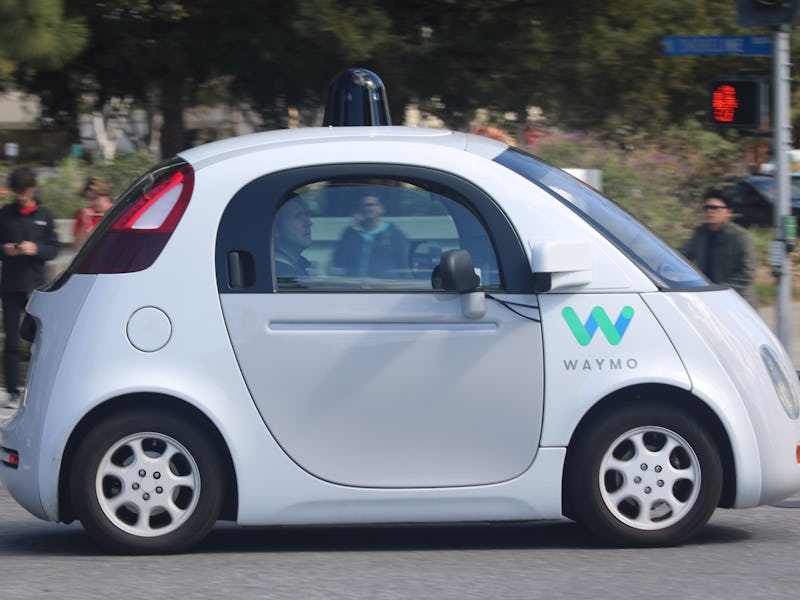5 Reasons to Watch Uber and Waymo's Self-Driving Car Trial Closely
It's already turned into a messy battle.

The legal battle between Uber and the Google-affiliated Waymo over self-driving technology has begun, and it’s already gotten messy.
Between all the allegations, lies, and leaked emails, the showdown is heating up in court over whether a Waymo employee stole trade secrets about the company’s navigation system, or lidar, when he moved to Uber.
After a year of pretrial discovery and legal wrangling, this week’s action in a San Francisco courthouse figures to do much to resolve the future of self-driving tech. Here’s what’s at stake.
#1. Is this what will cement Waymo’s position as industry leader?
Both Uber and Waymo look to position themselves as the early leaders in the race to get truly autonomous cars on the road, and having a legally protected edge when it comes to navigation will be a major advantage. With each side looking to claim the title of leader, the trial’s implications have everything to do with coming out on top — or at the very least, gain a piece of the pie. As some have noted, it will be up to Uber to gain back the momentum it lost during its legal embroilment in the lawsuit within the past year.
Waymo is the current top self-driving program in the industry in terms of tech advancement. The company has been running pilot programs for self-driving cars for nearly a decade, whereas Uber has only had one limited test run in Pittsburgh back in 2016. Waymo doesn’t need to emerge victorious here to remain the industry frontrunner, but this could make its advantage over Uber and other upstarts nearly insurmountable.
#2. Can Uber survive a legal defeat?
While Uber has, along with Lyft, revolutionized ride-sharing, there’s a good argument that its only long-term future lies in replacing human drivers with autonomous cars. For the company to be around in 10 years, it might need to take significant steps in the next couple years toward self-driving cars. This is the worst-case scenario, but losing access to potentially important information on lidar systems could be what we someday recognize as the beginning of the end for Uber.
#3. Could either company suffer public blowblack?
The companies have already made it clear in the past year just how acrimonious the case is for both sides — after all, there’s a good argument they are by now fighting over engineering secrets that are obsolete. So with the trial now finally beginning, there’s serious potential for public fallout and negative PR for both companies. Whether the trial ends with one side prevailing or a major settlement to keep Waymo happy, the outcome could well permanently affect the public perception of major players in the driverless vehicle industry.
#4. What could this mean for Silicon Valley as a whole?
This trial could help set precedent for what kind of information a person can take from one employer to the next. In an environment like Silicon Valley, where long-term employment isn’t really a thing, figuring out the line between an engineer’s own knowledge and what are a company’s trade secrets could have massive reverberations for the tech industry as a whole.
#5. Also, the story of this trial so far has been bonkers
The story of the trial in general has been full of twists and turns worthy of a spy novel, and it’s very much worth reading to the ending. Here’s the recap.
- Google’s self-driving car venture Waymo is suing Uber, alleging the startup’s troubled former CEO, Travis Kalanick, cheated to win the driverless war at all costs.
- Google claims that former Waymo engineer Anthony Levandowski stole 14,000 documents detailing Waymo’s lidar technology, then went on to work at Uber’s competition driverless car entity.
- Levandowski is set to testify in the trial this week.
- Emails made public show exchanges between a Google hardware engineer and the company’s attorneys discussing the lack of significance of the stolen files.
- Only five of the nine “trade secrets” that Waymo is suing Uber for were part of the 14,000 files Levandowski allegedly stole, implying Waymo knows more about the stolen documents.
- Uber’s attorneys call the allegations by Waymo a “conspiracy theory.”
- During the trial, jurors received a list of the stolen driverless intel secrets, and they’re being told they have to keep them secret forever. In other words: Take them to the grave.
- On the other hand, Uber does acknowledge the similarities between its autonomous vehicle lidar and Waymo’s. However, Uber doesn’t think the similarities warrant the allegations of trade secret theft. “Waymo doesn’t own every idea in its lidar. No one can own engineering concepts.”
- Uber’s acquisition of driverless car startup Otto has proven to be a major factor in the trial. This is because Otto, founded by Levandowski, is allegedly thought of as a coverup acquisition by Uber when the engineer went to work there.